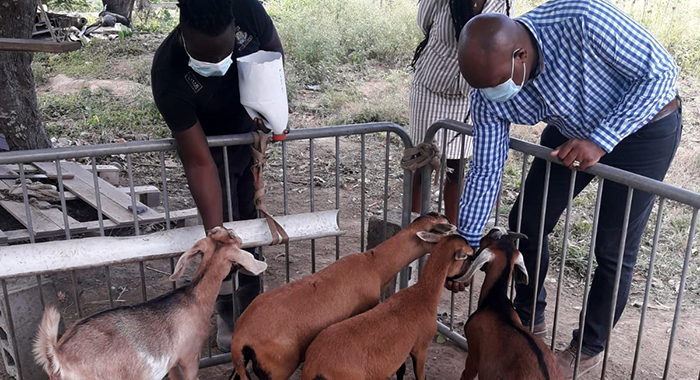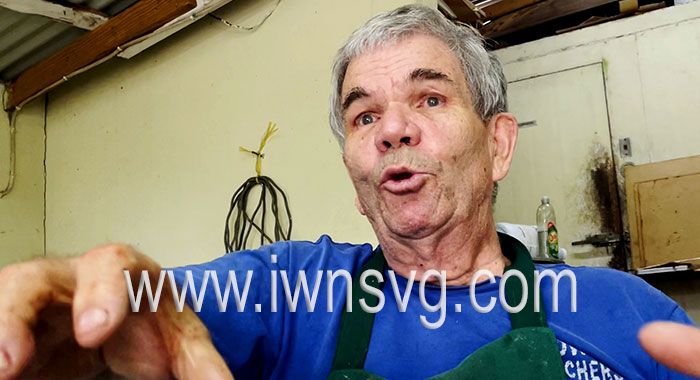A local butcher is considering closing his shop amidst a shortage of meat, even as St. Vincent and the Grenadines has been supplying Grenada with cattle and other livestock.
“It’s gone even worse now,” Richard Gibson, of Midway Butchers, told iWitness News on Sunday, five weeks after he initially spoke about the issue.
Gibson said he was unable to fill his orders for sausages for local hotels and that the retail prices of meat has increased significantly because of the shortage.
“If I don’t get any meat, by next week I’ll be closing. Beef and mutton — there is a severe shortage,” he said.
“The situation has gotten worse now. I was listening to the radio this morning with Camillo them talking about hotels opening up,” he said, referring to Minister of Finance Camillo Gonsalves.
“I’m wondering what you’re going to feed them with. Are they going to import all the meat to feed the hotel people if they can’t supply the meat from St. Vincent?” Gibson said.
“The shortage started with exporting too much of the animal and all the animals that are coming through to me now are very small animals…
“Where I used to get an average of 500- to 600-pound animals, I am only getting 250-pound animals and I need double the amount of animals to supply the same amount of meat. So that’s creating even more shortage.”
Butcher Richard GibsonGibson said that his mutton was done “and farmers have said they haven’t got any animals”.
Gibson’s comments sounded like a repeat of a 2019 interview with iWItness News, when he complained about the same issues.
Issue raised in Parliament
On Sunday, he was speaking three days after Minister of Agriculture, Saboto Caesar told Parliament that his government did not allow the most recent visit by the Grenadian businessman who buys livestock in St. Vincent.
Caesar was responding to a question tabled by opposition senator, Israel Brue, about the export of livestock.
Bruce was not in Parliament and Opposition Leader Godwin Friday asked the question on his behalf.
Bruce said that over the past few years, the Ministry of Agriculture and the minister have taken pride in live animals being sold to businesses in Grenada.
He said that recently local butchers have been complaining about the shortage of animals to slaughter and so satisfy their local customers.
The minister was asked to say whether his ministry had considered halting, even temporarily, the shipment and sale of live animals to Grenada so as to give local butchers and small business operators an improved opportunity.
The senator also wanted to know what production mechanism the ministry had put in place to facilitate this shortfall in livestock to meet the needs of local butchers and dependent small business operators.
Bruce also asked about the ministry’s current considerations to increase the fight against praedial larceny as a measure to also address the shortfall.

Caesar outlined the history of the livestock trade between Kingstown and St. George’s, which began a decade ago.
This led to the signing of a memorandum of understanding that Grenada will help SVG to establish a cocoa, condiments and spices industry.
In turn, SVG would sell livestock to Grenada and provide for them planting material for root crops, bananas and plantains.
Caesar said that as far back as 2014, the Veterinary Division recognised the importance of keeping a critical mass in the national herd and submitted six items to the Cabinet for approval.
Cabinet’s ‘risk management mechanism’
They arrangement was:
- That a quota of no more than 100 heads of cattle is to be selected for export per year from 2014 onwards;
- The production and slaughter figures must be reviewed annually to ascertain the export quota;
- Restrictions should be placed on the exploitation of males younger than two years of age;
- Only males that are of low genetic potency or have reproductive or production issues will be available for export;
- No productive female of breeding age should be exported, and,
- Females to be sold should be those out of production or have productive or reproduction issues.
Caesar commented:
“So, the cabinet basically approved a risk management mechanism because … we want to ensure that issues of food security and food sovereignty, that food must always be available, accessible and affordable in the country — that these must be addressed.”
Export on ‘pause for a moment’
He said that two week ago, the Grenadian buyer, Jude Jack, was expected in SVG to purchase animals.
Caesar, who, like Bruce, is a lawyer, said:
“And we requested of him to pause for a moment whilst we complete some calculations that we are doing because we have to speak to the farmers. “There are lawyers who are listening and when a case goes to a lawyer, the farmer don’t tell the lawyer don’t take that case. But there are some lawyers in St. Vincent and Grenadines want to tell cattle farmers who to sell their cattle to. “And there are many persons who have other ways of earning a living who want to dictate to cattle farmers, whether they could sell to Jude Jack to export to another member state of the OECS, the sub region… “But the answer is a simple one. What we have to do? We have to increase production and we continue as a ministry to encourage farmers to do so and we are working to create the enabling environment for such.”
Prices ‘really high’
However, in a Feb. 18 interview, Gibson told iWitness News that a severe scarcity of meat began to emerge after the Christmas season.
“Because just before Christmas, they exported about 70 cattle and a lot of pigs and small ruminants. So this created a shortage and the farmers put their price really high,” Gibson said.
“In March 2021, I was paying EC$2,500 for a 500lb cattle carcass. Today, I am paying $3,500 for the same cattle…
“The retail price is really high now. The retail price is $10 a pound. Nice boneless beef is about $14 a pound. Before, it was $12.”
He said that just before Christmas, he sold mutton for EC$12 a pound.
“I see a sign in town display mutton at $18 a pound,” Gibson said, adding that after he ran out of mutton at Christmas, he told customers to drive into the rural areas, where it was being sold at EC$ $14-15 a pound.
“I’m charging $15 a pound now for mutton. Pork is now $10 a pound. Before Christmas, it was $8-$8.50.”
Gibson said that despite the increased cost to butchers, consumers in St. Vincent want to pay the same price for meat year-round.
“In my experience, the price fluctuates — supply and demand. So if I buy cattle costing $200 – $300 more, I expect to up my price to compensate for that $300. But the Vincentian public, they don’t see it that way,” said Gibson, who also operated a butcher shop in the United Kingdom before returning to St. Vincent.
Gibson was also concerned about the quality of the meat supplied to local butchers.
“I used to get an average cattle about 600 pounds — nice, mature animal. The average weight that is coming in now is 200-250 pounds. So they’re now killing off all the younger animals. So this will create another shortage along the line.
“If a young calf is born today, it’s 15 months before it can be impregnated,” he said, adding that gestation is another nine months.
“When it calves, it’s another two and a half years to three years before the beef is mature enough to sell as good meat.”

‘expand production,’ minister says
Meanwhile, the agriculture minister told Parliament that his ministry is discussing with Prince Edward Islands help in artificial insemination and embryo transfer.
“Jamaica has never stopped supporting us with cattle semen,” he further said. “We have technicians available from Cuba and technicians came to St. Vincent and Grenadines to participate in a national artificial insemination drive.”
He said the government is looking into a public-private partnership “because this industry, the livestock industry, cannot be
“And I don’t want all of the work to reside in the Vet department. I want young persons or entrepreneurial, probably beneficiaries of the PRYME programme, to come forward and participate.”
Caesar’s comments came even as Gibson complained that his ministry was yet to send some young people to learn from him the art of butchering.
“Saboto had indicated to me that he would send some people from the YES programme so I could train them. On several occasions, I phoned the office and spoke to the minister’s secretary, who said he would get back to him,” Gibson said on Feb. 18, adding that it had been 12 weeks since their last conversation.
The agriculture minister said several young people have been selected and have gone off to study “issues touching and concerning livestock production”.
He spoke of the impact of last April’s eruption of La Soufriere volcano, adding that many pastures have been destroyed and tractor services are available for pasture rehabilitation.
“Again, I encourage the farmers to expand production,” Caesar said.
He said that as it pertains to praedial larceny, the legislation is still at the Attorney General’s Chambers.
“It’s undergoing review. There are several fundamental pillars, which I outlined during the debates on the Budget. “The livestock industry cannot only be inward focused. But we have to export to Grenada, to St. Lucia, to Barbados, to Trinidad and Tobago, and as many other places that we can sustain exports to… “And it pains to hear persons making folly of an industry that has so much potential by just going on radio and casting aspersions or [saying] ‘We just a truck load ah cattle gone dey. Caesar send way all de cattle.’ “The establishment of the Windwards food production corridor, another important area, and how we are going to use the opportunities in carbon credits to facilitate and to capitalise different areas to mitigate against climate change. “Those are the areas that we’re working on. And I just want to close on this. The livestock sector in St. Vincent and Grenadines will play a very important role in the diversification of agriculture. I hope that I was of some help.”Minister of Agriculture Saboto Caesar







Saboto you are late! You government only believe in tourism and not agricultures. Don’t forget you were placed in the dead-end ministry to make way for Camillo and you haven’t done anything over the past several years.
Minister has a lot to learn about the industry. I will teach him